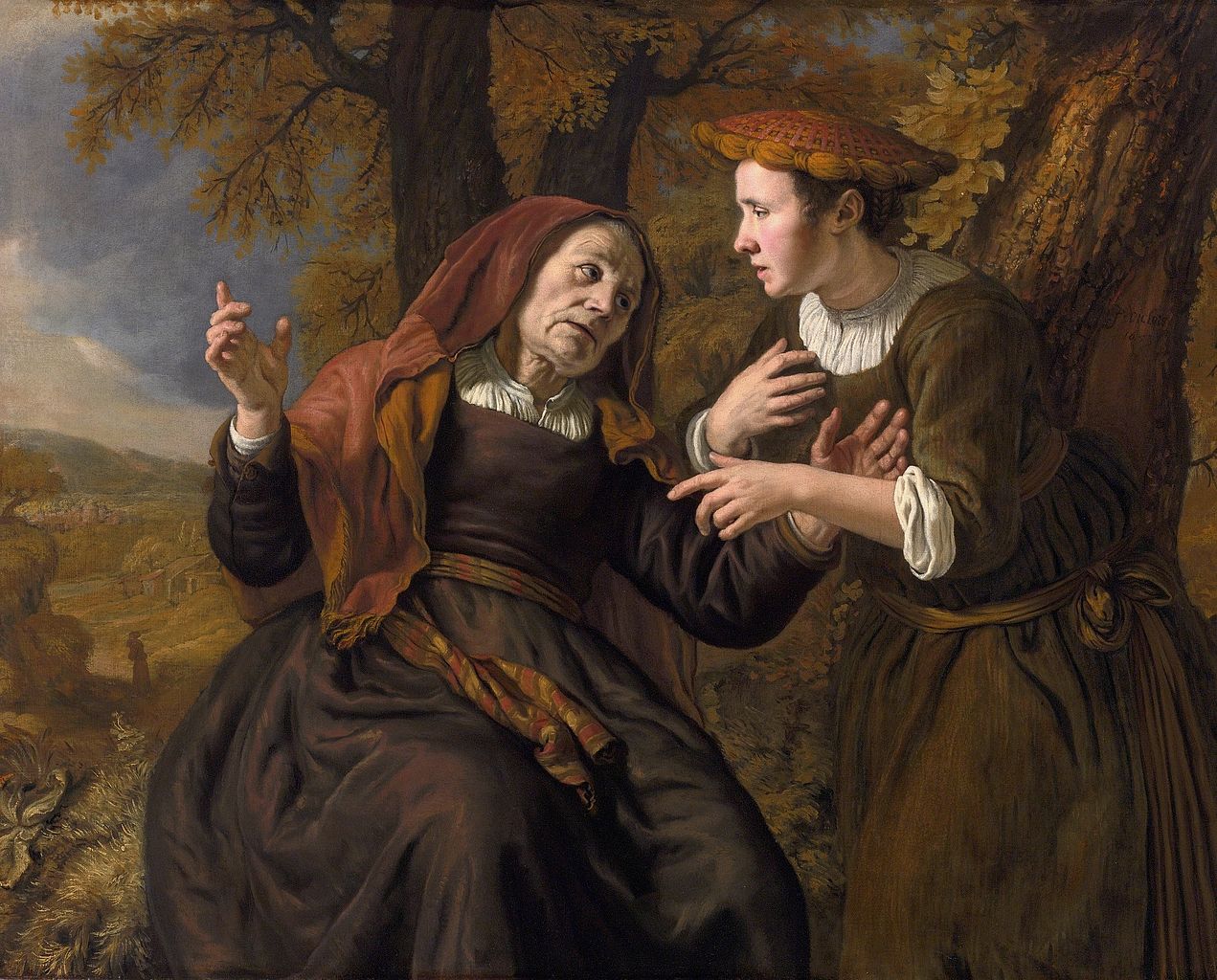|
ותאמר נעמי בִּתִּי עַרְבוֹת שָׂדֵךְ שְׁבִי
פֶּרַח וּפְרִי גַּנֵּךְ לָבִיא
מָה לָךְ רְעוֹת מֵיצָר צְבִי
מִצְאִי לָךְ מְנוּחָה בְּרֵעוּת וְשָׁלוֹם
|
Noémie dit: Ma fille, demeure aux abords de ton champ,
Apportes-en fruits et fleurs jusqu’à ton jardin.
Que poursuis-tu dans les confins d’une terre promise?
Trouve plutôt la sérénité dans l’amitié et la paix.
|
Naomi said: My daughter, remain in the embrace of your field;
Bear fruit and flowers in your garden.
Why chase the confines of a promised land?
Seek solace in the arms of friendship and peace.
|
|
ותען רות לִבִּי אַחַר פְּעָמַיִךְ
שָׂם פְּעָמָיו בִּנְדוֹדַיִךְ
אֵין בַּיִת לִי כֶּאלֹהַיִךְ
שֹׁכַנְתְּ בַּשָּׂדֶה אֹהָלַיִךְ שָׁלוֹם
|
Et Ruth répondit: Mon cœur, dans le sillage de tes pas
Choisit de placer les siens, pour vagabonder.
Je n’ai, pas plus que ton Dieu, de demeure fixe;
Ô résidente des champs, en tes tentes règne la paix!
|
And Ruth replied: In the footsteps of your wandering feet
My heart chooses to journey.
Like your God, I have no fixed abode;
O dweller of the field, in your tent reigns peace!
|
|
ותאמר נעמי בִּתִּי נִרְדִּי רֵיחוֹ אָבַד
שִׂמְלַת יָגוֹן לְגֵוִי בַד
לִבְשִׁי עֵלוֹם אֵל לָךְ זָבָד
אֲנִי אֵלֵךְ לִמְקוֹם אִמּוֹתַי בְשָׁלוֹם
|
Noémie dit: Ma fille, mon nard a perdu son arôme,
Seule la tristesse tient encore chaud à ma carcasse.
Revêts donc la jeunesse dont t’a graciée l’Éternel;
Cependant, je m’en irai rejoindre mes aïeules en paix.
|
Naomi said: My daughter, my nard has lost its fragrance;
Sadness is my sole companion.
Adorn yourself with the youth bestowed by God;
But I shall go to my foremothers’ fold in peace.
|
|
ותען רות אַף אִם לִבֵּךְ עָטָה אֵבֶל
שִׁירוֹ יֶעֱרַב מִשִּׁיר נֵבֶל
חֵיקֵךְ חֶלְקִי מִכָּל חֵבֶל
כִּי בוֹ תוֹרַת חַיִּים וְאַהֲבַת שָׁלוֹם
|
Et Ruth répondit: Même vêtu d’une robe de deuil,
Le chant de ton cœur m’est plus agréable que tout autre.
Je choisis en héritage ta part parmi toutes;
Elle porte la Tora de vie et l’amour de la paix.
|
And Ruth replied: Though robed in mourning, the song of your heart
Is more pleasing to me than any other.
I choose as inheritance your portion of all;
It bears the Torah of life and the love of peace.
|
|
ותאמר נעמי בִּתִּי יָדַעְתְּ כִּי לְפוּקָה
הִיא לִי כוֹסִי כּוֹס מְצוּקָה
וְעוֹד נַפְשֵׁךְ בִּי חֲבוּקָה
אֲבַקְשָׁה נָּא טוֹב לָךְ אֲדַבְּרָה שָׁלוֹם
|
Noémie dit: Ma fille, tu sais bien mon infortune,
Consciente que tu es du malheur qui est mon lot,
Et pourtant, ton âme demeure à la mienne si attachée.
Je ne souhaite, pour toi, que le bon; mes paroles sont paix.
|
Naomi said: My daughter, you know my troubles;
Misfortune is my lot.
Yet your soul remains entwined with my own –
I wish good unto you; my speech is peace.
|
|
ותען רות טוּב תּוֹרַת פִּיךְ לֹא אֶטּוֹשָׁה
בּוֹ אַחֲזִיק לֹא אֵבוֹשָׁה
גַּם כִּי אַזְקִין בָּךְ אֶדְרוֹשָׁה
מָצָאתִי בְחֵילֵךְ שַׁלְוָה וְגַם שָׁלוֹם
|
Et Ruth répondit: Jamais je ne renierai le doux enseignement de ta bouche;
À lui je m’accroche, contre vents et marées.
Au crépuscule de mon âge, je m’y abreuverai encore.
Auprès de toi, j’ai trouvé la quiétude et la paix.
|
And Ruth replied: I shall never forfeit the sweet teachings of your mouth;
I will cling to them against all odds.
In the twilight of my years, still shall I sip from its well.
With you have I found tranquility and peace.
|
|
שִׂישִׂי שִׂמְחִי פִּרְצִי פֶרֶץ
תּוֹרָה אֲשֶׁר בִּשְׁמֵי עֶרֶץ
בָּךְ נָֽשְׁקָה אֱמֶת אֶרֶץ
כִּי נָֽעֲמָה דַּרְכֵּךְ נְתִיבָתֵךְ שָׁלוֹם
|
Sois heureuse! Réjouis-toi et exulte!
La Tora, venue du ciel,
Épouse, en ta personne, la vérité terrestre,
Car ta voie est aménité (noam), ton sentier est paix.
|
Rejoice and elate, break out of your bounds!
The heavenly Torah has indeed,
Through you, encoutered the earth,
For your way is sweet (naʿama) and your path is peace.
|

